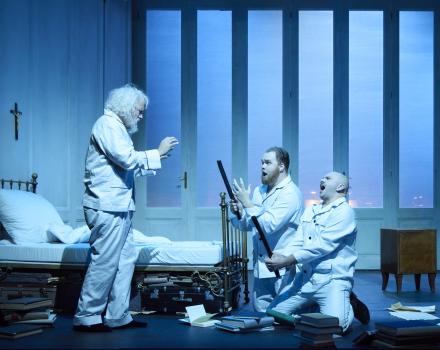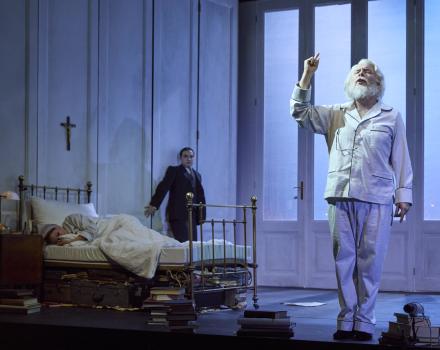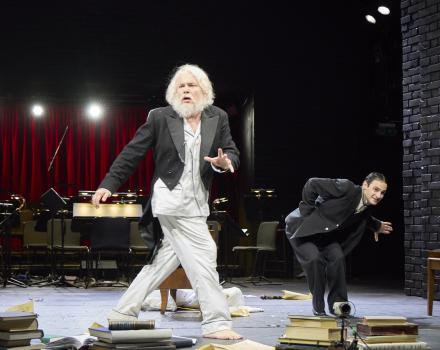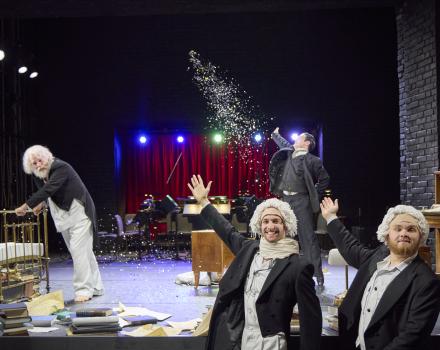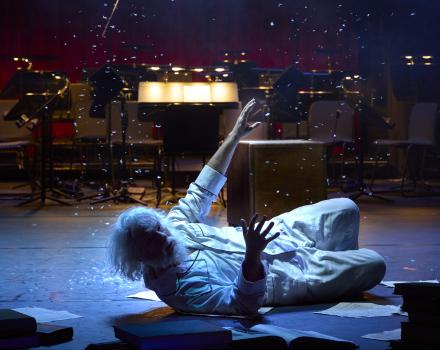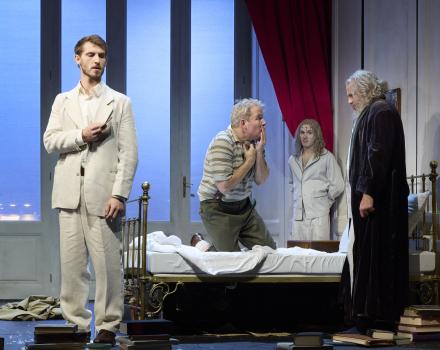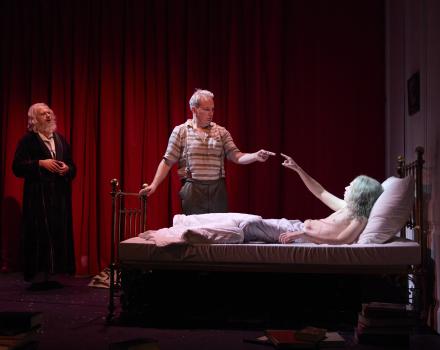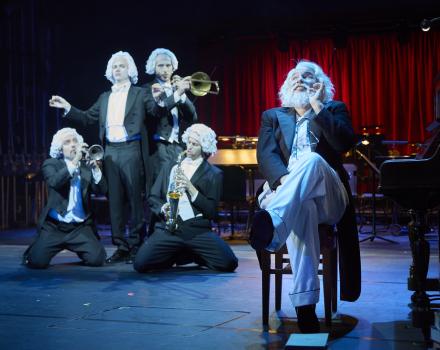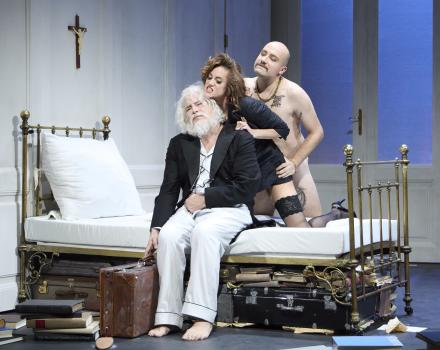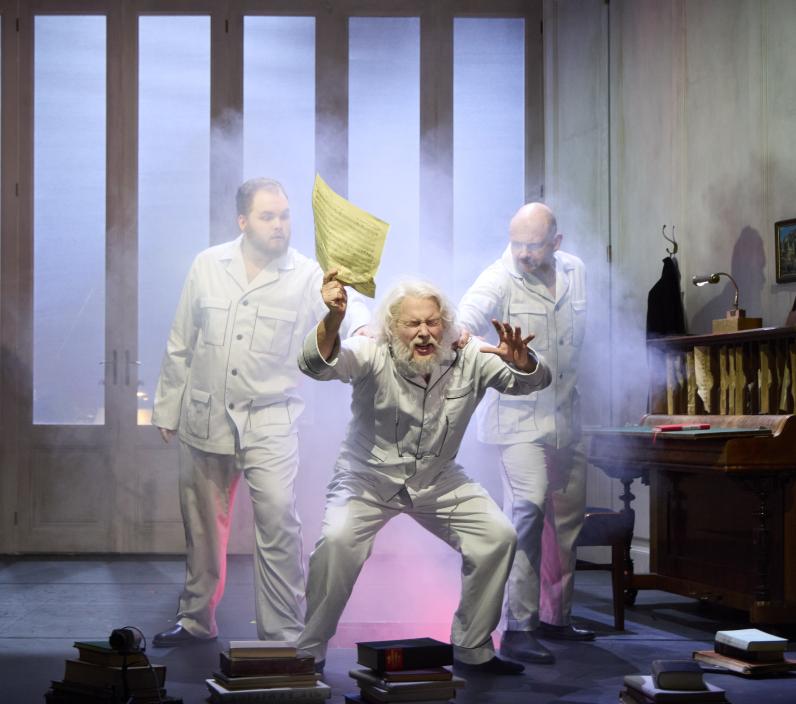
Der Prozess

‘Someone must have slandered Josef K, for one morning, without having done anything wrong, he was arrested.’ This is the famous opening line of Franz Kafka’s novel Der Prozess (The Trial). Gottfried von Einem’s opera of the same name also begins with this mysterious arrest. Josef K. suddenly finds himself in a world he cannot understand, faced with an accusation of which he knows nothing but which seems perfectly clear to everyone else and yet remains inexplicable; with an absurd court case that nevertheless follows strict rules; with an arrest that appears to have no effect on his life yet still leads to his death. Is Josef K. the victim of a conspiracy, or is his belief in a conspiracy the only chance of explaining an incomprehensible world?
Gottfried von Einem’s opera was first performed in 1953 when the popularity of Kafka’s work had reached its first peak. His music uses pulsing rhythms, recurring structures and echoes of jazz and twelve-tone music to describe the subtle terror of the novel, without losing sight of the grotesque humour of the source material. Today, 100 years after Kafka’s death and in a world of digital overindulgence and constant surveillance, we look at this trial in a radically different light. MusikTheater an der Wien’s acclaimed new production, arranged by Tobias Leppert as a chamber opera, is conducted by Walter Kobéra and directed by Stefan Herheim.
CAST
|
Josef K.
|
Robert Murray
|
|---|---|
|
The woman
|
Anne-Fleur Werner
|
|
Franz / The factory owner / The priest
|
Alexander Grassauer
|
|
Willem / The lawyer
|
Timothy Connor
|
|
The inspector / The chief clerk of the court
|
Leo Mignonneau
|
|
The student / Titorelli / 1st young man
|
Valentino Blasina
|
|
The court usher / The passer-by / 2nd young man
|
Lukas Karzel
|
|
The examining magistrate / Uncle Albert / 3rd young man
|
Philipp Schöllhorn
|
|
Kafka
|
Fabian Tobias Huster
|
|
Orchestra
|
Klangforum Wien PPCM Academy
|
| ... | |
|
Music
|
Gottfried von Einem
Arrangement for small orchestra by Tobias Leppert
|
|---|---|
|
Text
|
Boris Blacher
Heinz von Cramer
|
|
Conductor
|
Walter Kobéra
|
|
Director
|
Stefan Herheim
|
|
Sets
|
Silke Bauer
|
|
Associate set designer
|
Anna Kreinecker
|
|
Costumes
|
Nina Paireder
|
|
Lights
|
Franz Tscheck
|
|
Dramaturgy
|
Kai Weßler
|
|
Film director
|
Philippe Ohl
|
|
|
|
| ... | |
CAMPUS cooperation with students of Musik und Kunst Privatuniversität der Stadt Wien, Universität für Musik und darstellende Kunst Graz and Universität für Musik und darstellende Kunst Wien.
A co-production of MusikTheater an der Wien at Kammeroper with Neue Oper Wien, supported by Gottfried von Einem Musik-Privatstiftung
© 1953 by Boosey & Hawkes Bote & Bock GmbH, Berlin - With kind permission of Boosey & Hawkes Bote & Bock, Berlin.
A production of Heliane Media & Consulting for Vereinigte Bühnen Wien / MusikTheater an der Wien at Kammeroper Wien
© Heliane Media & Consulting / Vereinigte Bühnen Wien 2025. All rights reserved
VIDEOS
Story
Part 1
The arrest. At eight o’clock one morning, two men claiming to be guards of the court come to Josef K.’s flat to inform him of his arrest. The officer in charge of the guards appears with three other men and plays down the seriousness of the measure. He encourages Josef K. to continue working at his bank, leading the latter to suspect a miscarriage of justice. Left alone, Josef K. falls to musing about the state and the rule of law.
Fräulein Bürstner. Josef K.’s neighbour tells him that she will soon be starting work at a lawyer’s office and offers to help him with his trial. His attempts to recreate the arrest for her turn into a sexually-charged tussle.
First examination. Josef K. appears in court where he speaks out passionately against despotism and corruption in the judicial system. His speech earns him a round of applause and it soon emerges that the examining magistrate he criticised is in a sexual relationship with one of the court employees.
The usher’s wife. The examining magistrate’s lover offers to help Josef K. At once fascinated and disgusted, he agrees until another of her lovers appears – a loutish student who makes his intentions very clear. Josef K. wants to rescue the woman from her predicament, but she declines his help and lets the student carry her to the examining magistrate. To Josef K.’s surprise, the usher is well aware of his wife’s many affairs but is content to fantasise about inflicting violence on her lovers.
Second examination. Josef K. returns to court and now accuses everybody of plotting against him. The examining magistrate announces that the accused has forfeited all the advantages he had previously gained.
Part 2
The floggers. The two guards are to be punished because Josef K. made a complaint against them. The more he tries to spare them the more they insist on being flogged.
A fresh summons. A passer-by warns Josef K. to make sure he appears in court on time and behaves properly.
Uncle Albert. As a member of the party executive, Uncle Albert is looking into the case of his nephew, Josef K. The two of them arrive unannounced at the offices of Huld, a lawyer. Because Huld is in the middle of having fun with a woman, he sends a message to the two men saying he is unwell. But Uncle Albert refuses to go away and discovers Leni – his own lover – getting out of the lawyer’s bed. For appropriate payment, Huld is willing to take on K.’s case and summons the chief clerk of the court who is supposedly the only one who can save Josef K. But now K. only has eyes and ears for Leni. She instructs him to submit to the court and make a confession, saying it is the only way to fulfil his destiny. Josef K. seals his alliance with Leni with a passionate kiss.
The factory owner. The prospect of perfect happiness soon gives way to the humdrum routine of a bank employee. One of Josef K.’s business partners advises him to consult an artist who paints portraits of judges.
The painter. Titorelli explains to K. that the accused is inextricably linked to the court. Josef K. finds this visit all the more dispiriting because the painter spends the entire time indulging in lustful activity with a woman who insults Josef K., calling him ugly.
In the cathedral. Josef K. thinks he has found his ultimate judge in the person of a priest. The clergyman predicts that the trial will end badly and criticises Josef K. for seeking too much outside assistance from women. Josef K. realises how much of his male anxieties and unfulfilled longings he projects onto the women. The priest refuses to commit to a clear judgement, leaving Josef K. at a loss.
The execution. Between hope and conviction Josef K. has completely lost his way and himself. Consequently, the game is up for him.
GALLERY
